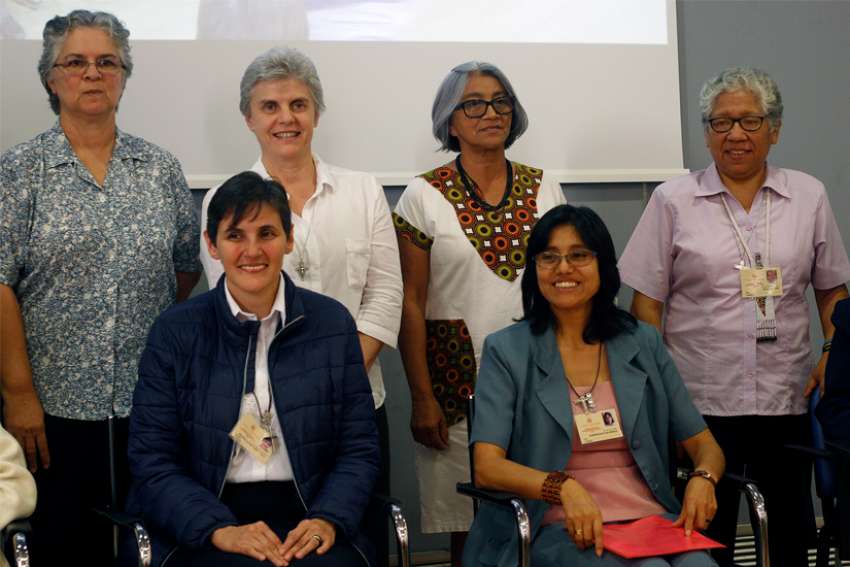The Catholic Church does not need "to create ministries (for women), because women are already present" as ministers in remote communities, Sister Mary Agnes Mwangi, a Consolata Missionary who works in Brazil, told journalists Oct. 18.
Sister Mwangi is one of 10 sisters elected by the International Union of Superiors General to be observers at the synod. Unlike the religious men elected by their superiors general, the women are not voting members of the synod.
Besides guiding their families, women build solidarity in their communities and are involved in education, both informally and as schoolteachers, Sister Mwangi said. They also serve as catechists, lead liturgies of the Word, prepare people to receive the sacraments and "do a lot of listening," she said.
Thirty-two religious and laywomen are participating in the synod, said Capuchin Sister Daniela Adriana Cannavina, secretary-general of the Latin American and Caribbean Confederation of Religious.
"The voice of religious life, especially of women, has been heard" in the plenary sessions and small-group discussions on which the synod's recommendations will be based, Sister Cannavina said. "This is a prophetic hour for religious life."
Various participants in the synod, both women and bishops, advocated for allowing women to be ordained deacons as a way of recognizing the importance of their role in the Amazonian church.
Even if Pope Francis accepts that proposal, implementing it will take time, Sister Cannavina said. Meanwhile, women must become more involved in decision-making and take on more leadership roles in pastoral work, including formation and catechetics. Women also should be involved in the formation of seminarians, she said.
Religious life in the Amazon must be marked by four characteristics, Sister Cannavina said. First, it must be intercultural, as sisters immerse themselves in the culture of the place they live. Second, sisters are increasingly forming intercongregational teams to work in a particular place or on an issue, such as human trafficking.
The third characteristic is dialogue, especially between people involved in pastoral work and laypeople, to foster shared responsibility, she said. Sisters also balance "itinerancy and presence," she said. While sisters tend to be more rooted in communities, compared to priests who may visit villages only briefly to administer sacraments, they also represent a church that "goes out" of its comfort zone and seeks new pathways, she said.
One of those pathways took Sister of Our Lady Raimunda Nonata de Aguiar Bezerra to the fringes of Rio Branco, Brazil, near that country's remote borders with Peru and Bolivia. Families who are forced to leave their rural villages and move to the city settle around the edge of the city, where they face poverty and hardship.
In peripheral neighborhoods marked by poverty, drug trafficking, prostitution and unemployment, suicide is not uncommon among young people who see no future, Sister Bezerra said. Women and girls, especially, risk being trapped by human traffickers who lure them with promises of work and then transport them across the countries' poorly controlled borders for the sex trade.
For Servants of the Sacred Heart of Jesus Sister Nelly Sempertegui Ramirez, the path led to Peru's northern Amazonas region, where she directs and teaches at a postsecondary technological institute.
Few young women there have a chance to get a higher education, but when parents do support their daughters in their studies, those young women become the ones who fight for their communities' rights, she said. She and other sisters involved in education have helped "raise the cry of young people" during the synod, she said.
"We are missionaries -- we were born for mission," said Sister Gloria Liliana Franco Echeverri of the Order of the Company of Mary, Our Lady, president of the Latin American and Caribbean Confederation of Religious. "We were born to go to those places where others do not go."
That mission, she said, stems from "the conviction that consecrated life is prophecy, and at this moment in history, when the Amazon faces so many complex problems, we must not forget this important nuance of religious life."


